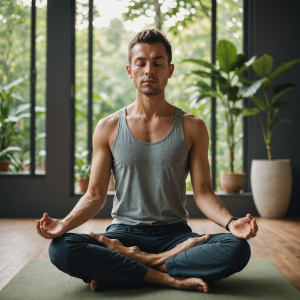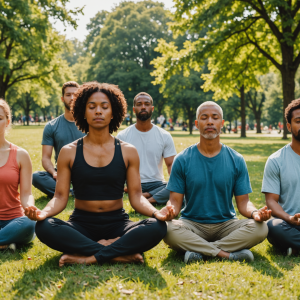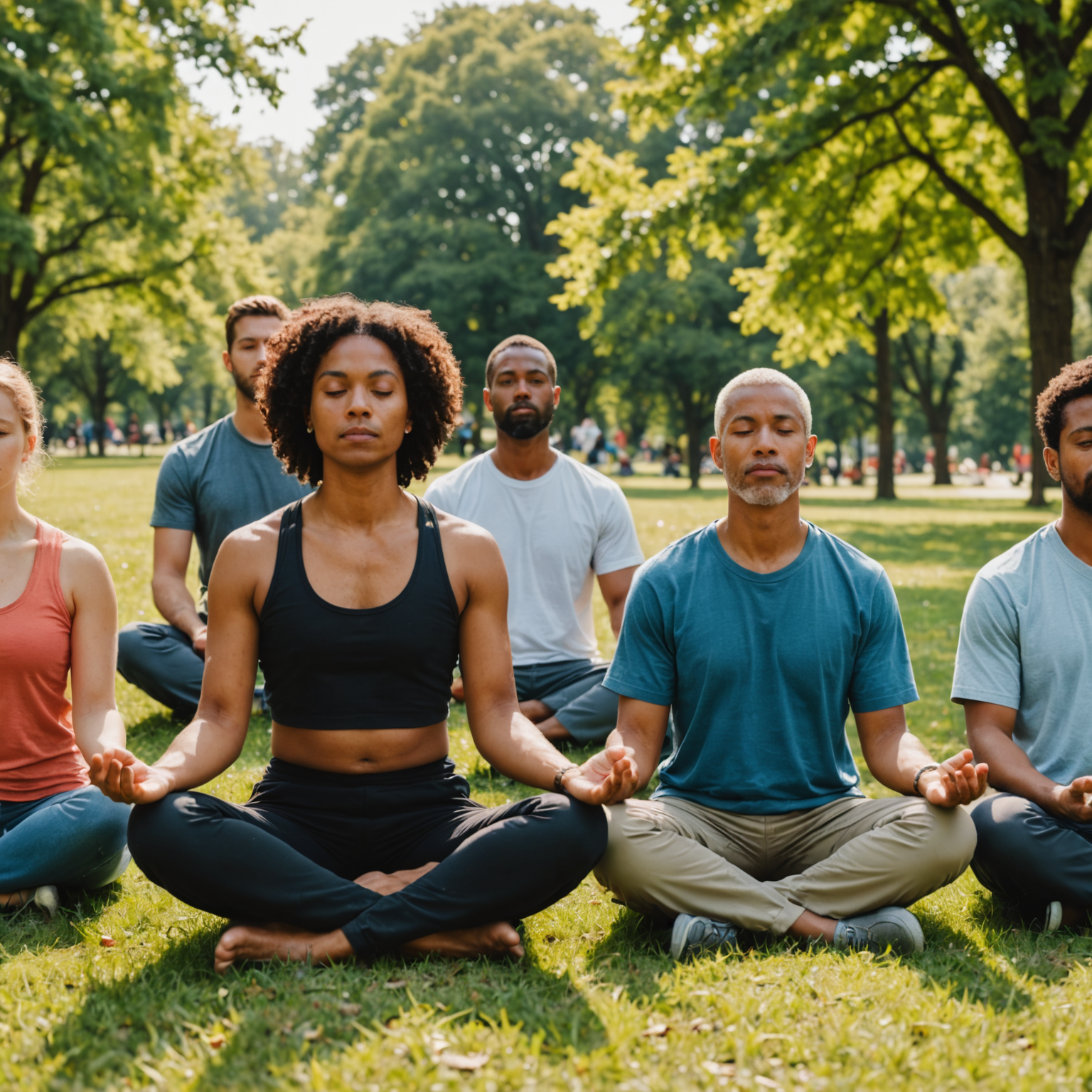In a world where stress often overshadows our daily lives, mindfulness emerges as a powerful tool for reclaiming peace and clarity. By learning to be fully present, we can transform not just our mindset, but our overall well-being.
What You Will Learn
- Mindfulness originates from ancient Buddhist practices and emphasizes being present without judgment.
- Modern mindfulness integrates practical techniques like mindful breathing and daily activities to enhance mental health.
- Regular meditation fosters better focus, clarity, and emotional regulation, making mindfulness accessible to all.
- Engaging with mindfulness can lead to improved relationships through enhanced empathy and active listening.
- Future trends, such as AI integration and community-based mindfulness, are shaping the evolution of mindfulness practices.
- Starting small and utilizing available resources can effectively help you embrace mindfulness in your daily routine.
Mindfulness Journey: From Ancient Roots to Modern Practice
Explore the evolution of mindfulness, its core practices, and future trends in this visual summary.
Defining Mindfulness & Historical Roots
At its core, mindfulness is the practice of being fully present and engaged in the moment, free from distractions or judgment.
- Originated over 2,500 years ago (Buddhist teachings).
- Traditionally linked to meditation practices.
- Modern adaptations focus on psychological well-being.
Modern Interpretation & Practices
Mindfulness is now a practical tool for improving everyday life and mental health.
- Breathing exercises & daily integration.
- Mindfulness-Based Stress Reduction (MBSR).
- Accessible to everyone, regardless of background.
Impact on Life and Well-Being
Mindfulness offers profound benefits, enhancing overall well-being.
- Improved Mental Health (reduced anxiety/depression).
- Enhanced Emotional Regulation.
- Increased Focus and Clarity.
- Stronger Relationships.
Future Directions in Mindfulness
The field of mindfulness continues to evolve with new research and applications.
- AI Integration for personalized practices.
- Nature-Based Practices.
- Enhanced Emotional Intelligence.
- Community Mindfulness programs.
Understanding Mindfulness: A Comprehensive Overview
Mindfulness has been a buzzword in recent years, but what does it truly mean? At its core, mindfulness is the practice of being fully present and engaged in the moment, free from distractions or judgment. Its roots trace back thousands of years, originating from ancient meditation practices primarily within Buddhist traditions. This concept encourages individuals to observe their thoughts, feelings, and bodily sensations with a sense of gentle curiosity. For those seeking deeper personal insights, exploring cannabis as a tool for self-knowledge can also offer a unique path to introspection.
The historical journey of mindfulness is fascinating. While its essence remains unchanged, how we understand and apply it has evolved. In ancient cultures, mindfulness was often seen as a path to enlightenment. Today, many people view it as a practical tool for improving everyday life, focusing on mental health and emotional balance.
Defining Mindfulness and Its Historical Roots
As we dive deeper into the definition, mindfulness encompasses both awareness and acceptance. This means being conscious of the present moment without trying to change it. This practice helps foster a connection between mind and body, allowing us to appreciate life in its raw form.
- Originated from Buddhist teachings over 2,500 years ago.

Finding Calm In Everyday Moments - Traditionally linked to meditation and spiritual practices.
- Modern adaptations focus on psychological well-being.
Understanding these historical roots provides context for how mindfulness is perceived today. By recognizing its rich history, we can appreciate the depth and significance of being present.
The Modern Interpretation of Mindfulness Practices
In today’s fast-paced world, mindfulness has taken on a new life. Many individuals and professionals now see it as an essential practice for maintaining mental health and emotional well-being. The interpretation has shifted towards practical applications, making mindfulness accessible to everyone, regardless of their background.
- Mindfulness meditation techniques, such as breathing exercises.
- Integrating mindfulness into daily activities like eating and walking.
- Mindfulness-based stress reduction (MBSR) programs in healthcare.
This modern approach emphasizes that anyone can practice mindfulness, and it doesn’t require years of training. Simple techniques can lead to profound changes in how we navigate daily challenges, much like how small changes in fashion can refresh your style, as discussed in the best elevated basics to refresh your closet.
The Role of Meditation and Presence in Mindfulness
When we think of mindfulness, meditation often comes to mind. Meditation serves as a powerful tool that enhances our ability to practice mindfulness. By training the mind to focus, we can cultivate a deeper state of awareness and presence that spills over into our daily lives.
This presence is vital; it’s about tuning into our immediate experiences and letting go of the worries about the past or future. This shift can lead to a more fulfilled and engaged life. Think of meditation as a workout for your mind: the more you practice, the stronger your mindfulness muscle becomes!
- Regular meditation sessions can improve focus and clarity.
- Mindful breathing techniques help reduce stress levels.
- Presence boosts emotional regulation and self-awareness.
So whether you’re meditating for a few minutes daily or simply taking a moment to breathe during a hectic day, know that every little bit contributes to a more mindful existence!
Pro Tip
Did you know? Incorporating just a few minutes of mindfulness into your daily routine can significantly enhance your overall well-being. Try setting aside 5 minutes in the morning to practice mindful breathing. This simple act can help you start your day with clarity and focus, setting a positive tone for the hours ahead!
Summarizing the Impact of Mindfulness on Life and Well-Being
As we delve into the world of mindfulness, it’s essential to recognize the profound impact it can have on our daily lives. From reducing stress to enhancing emotional regulation, mindfulness practices offer a variety of benefits that can transform our overall well-being. I’ve seen firsthand how incorporating mindfulness into my routine—through simple exercises and meditation—has changed my outlook on life!
Here are some key takeaways on the benefits of mindfulness:
- Improved Mental Health: Regular mindfulness practice can lead to reduced symptoms of anxiety and depression.
- Enhanced Emotional Regulation: Mindfulness helps cultivate self-awareness and emotional resilience.
- Increased Focus and Clarity: By practicing mindfulness, individuals often report better concentration and decision-making skills.
- Stronger Relationships: Mindfulness encourages empathy and active listening, leading to healthier interpersonal connections.
These benefits highlight why mindfulness is a vital practice for enhancing quality of life. As we look toward the future, it’s also exciting to consider the emerging trends in mindfulness that will shape our practices.
Future Directions in Mindfulness Research and Practice
The landscape of mindfulness is constantly evolving, with new research emerging to support its effectiveness. As I explore this field, I’m excited to see how mindfulness will be integrated with modern technologies and practices. The possibilities are truly fascinating!
Some of the future directions in mindfulness research include:
- AI Integration: Tools that use artificial intelligence to personalize mindfulness practices based on individual needs.
- Nature-Based Practices: Increased focus on mindfulness practices in natural settings to promote well-being and environmental sustainability.
- Emotional Intelligence: Research on how mindfulness enhances emotional intelligence and resilience in personal and professional settings.
- Community Mindfulness: Developing community-based programs that foster collective mindfulness practices.
By paying attention to these trends, we can adapt our mindfulness practices to better suit our changing world, ensuring we continue to grow and thrive.
Encouraging Mindfulness Practices: Your Next Steps
If you’re inspired to embrace mindfulness in your life, taking the next steps is key! You don’t need to overwhelm yourself with intricate practices; instead, start small and build gradually. As someone who has walked this path, I can assure you that even a little mindfulness can go a long way!
Here are some resources and approaches to help you build a mindfulness routine:
- Mindfulness Apps: Utilize apps like Headspace or Calm for guided meditations and mindfulness exercises.
- Online Resources: Websites and platforms that offer courses or guided sessions on mindfulness.
- Local Classes: Look for classes or workshops in your area that focus on mindfulness techniques.
- Books and Literature: Consider reading books that explore mindfulness practices and theories.
With these resources at your fingertips, you can easily start integrating mindfulness into your day-to-day life.
FAQs About Mindfulness
- What is mindfulness?
- Mindfulness is the practice of being fully present and engaged in the moment, observing thoughts, feelings, and bodily sensations without judgment.
- Where did mindfulness originate?
- Mindfulness originated over 2,500 years ago from ancient Buddhist practices, traditionally linked to meditation.
- What are the key benefits of practicing mindfulness?
- Benefits include improved mental health (reduced anxiety/depression), enhanced emotional regulation, increased focus and clarity, and stronger relationships through empathy and active listening.
- How can I start practicing mindfulness?
- You can start with simple techniques like mindful breathing, using mindfulness apps (e.g., Headspace, Calm), exploring online resources, or attending local classes. Starting with a few minutes daily can make a significant difference.
- How does meditation relate to mindfulness?
- Meditation is a powerful tool that enhances mindfulness by training the mind to focus, cultivating a deeper state of awareness and presence that extends into daily life.
- What are the future trends in mindfulness?
- Future trends include AI integration for personalized practices, nature-based mindfulness, research into enhanced emotional intelligence, and community-based mindfulness programs.
Join the Mindfulness Community: Sharing Experiences and Support
Connecting with others on this mindfulness journey can significantly enhance your experience. Sharing your thoughts, challenges, and successes fosters a supportive community that encourages growth. I’ve found that being part of such groups provides motivation and valuable insights! For those looking to improve their connections and understanding of others, exploring topics like how to let go of defensiveness in relationships can be highly beneficial.
Consider joining mindfulness-focused communities, whether online or in-person, where you can:

- Participate in Discussions: Engage in conversations about mindfulness practices and share personal experiences.
- Find Accountability Partners: Connect with others to stay committed to your mindfulness goals.
- Attend Meetups: Look for local mindfulness or meditation groups that host regular gatherings.
- Contribute to Workshops: Share your knowledge and learn from others in organized sessions.
By joining a mindfulness community, you’ll not only enhance your practice but also develop rewarding relationships with like-minded individuals.
Exploring Mindfulness Retreats and Guided Meditation Opportunities
For those looking to deepen their mindfulness experience, retreats and guided meditation sessions can provide a wonderful opportunity. These events allow you to immerse yourself in mindfulness practices, often in beautiful and tranquil settings. I’ve attended a few retreats myself, and they were truly transformative!
When considering a mindfulness retreat, keep in mind:
- Duration: Retreats can range from a weekend to several weeks, so choose one that fits your schedule.
- Focus: Some retreats emphasize specific themes, such as stress relief or self-discovery, so find one that resonates with your goals.
- Instructor Credentials: Look for qualified instructors with experience in mindfulness and meditation practices.
- Location: A peaceful environment can enhance your experience, so consider retreats in nature or serene settings.
Exploring these opportunities will not only deepen your practice but also enrich your understanding of mindfulness as a holistic approach to well-being.
Recap of Key Points
Here is a quick recap of the important points discussed in the article:
- Understanding Mindfulness: Mindfulness is the practice of being fully present, rooted in ancient meditation practices.
- Modern Applications: Mindfulness techniques are accessible to everyone and can be integrated into daily activities.
- Meditation’s Role: Regular meditation enhances mindfulness, improving focus, emotional regulation, and presence.
- Benefits of Mindfulness: Includes improved mental health, emotional resilience, increased focus, and stronger relationships.
- Future Directions: Emerging trends include AI integration, nature-based practices, and community mindfulness programs.
- Community Support: Joining mindfulness communities can provide motivation and shared experiences.
